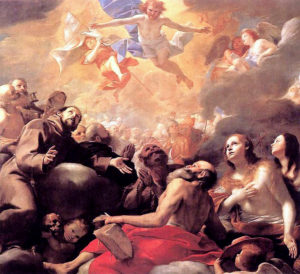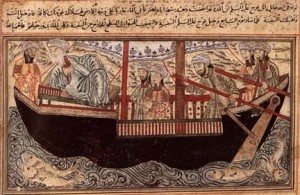Thoughts on Sunday’s Lessons for Dec. 1, 2019
First Reading: Isaiah 2:1-5
Advent begins, and with it a new Lectionary year. We have completed our year with the Gospel of Luke, and now turn to Matthew’s Gospel for the next 12 months. Advent begins the church year as a time of preparation and expectation for the coming celebration of the birth of Jesus.

Christ in Glory (c.1660), oil painting by Mattia Preti (1613-1699). Museo del Prado, Madrid. (Click image to enlarge.)
As we look forward to Christmas Day, our readings foresee a bright Messianic future. In verses of poetic beauty in the first reading, the prophet Isaiah foresees Jerusalem and its Temple restored. It will be the highest of the mountains, the center of a world that recognizes it as the house of God. It will be a world of peace, a time when swords have been beaten into plowshares and there is no more war.
Psalm: Psalm 122
This Psalm, attributed by legend to King David, sings counterpoint to our Isaiah reading. It looks toward a glorious future, too, a time of triumph and peace for Jerusalem, the city of God, the throne of the new King David, the Messiah. The house of David is a city at peace, a city on a mountain where all the tribes of Israel go up with gladness to praise God’s name. At David’s throne, all the people can expect fair judgment; there the love of God is rewarded with security, prosperity and peace.
Second Reading: Romans 13:11-14
We will read Paul’s letter to the Romans in three of the four Sundays of Advent. His last letter, written to introduce himself to the young church in Rome just before he sailed there some 25 years after the death and resurrection of Christ. In this passage we hear Paul exhorting the people to be prepared for the return of Jesus, an event that Christians of that time expected to come very soon. “The night is far gone, the day is near,” Paul assures his flock. In the meantime, he calls on them to “put on the armor of light” by behaving well, living abstemiously, and avoiding quarrels and jealousy.
Gospel: Matthew 24:36-44
In this passage from Matthew’s Gospel, we see Jesus talking with the apostles on a hillside on the Mount of Olives, looking across a small valley toward the Temple. In preceding verses Jesus has told them – in words similar to those told by Luke two weeks ago – that the temple will be torn down amid a time of war and great suffering, before Christ comes to usher in a new age. Now, in Sunday’s Gospel, Jesus warns them that only God knows when the last days will come, just as sinful humans in Noah’s time had no warning of the coming flood. This frames a simple Advent message: Be ready. Be prepared. Live as if Christ might return at any hour.


